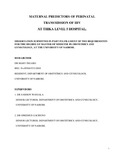| dc.contributor.author | Ingabo, M | |
| dc.date.accessioned | 2014-07-01T09:02:12Z | |
| dc.date.available | 2014-07-01T09:02:12Z | |
| dc.date.issued | 2014 | |
| dc.identifier.citation | Degree Of Master Of Medicine In Obstetrics And Gynecology,2014 | en_US |
| dc.identifier.uri | http://hdl.handle.net/11295/71459 | |
| dc.description.abstract | BACKGROUND: Perinatal transmission of Human Immunodeficiency Virus has been shown to
be the main route of transmission to children accounting for 90% of new paediatric HIV
infection in Kenya. Prevention of perinatal transmission is a major goal in care of HIV positive
pregnant women. The country has made commitment to eliminating vertical transmission. By
determining the factors that are associated with perinatal transmission, further strategies can be
drawn to address these shortcomings.
OBJECTIVE: To determine the difference in maternal factors that determine perinatal HIV
transmission between HIV infected women with 2 year old children who are confirmed HIV
positive and negative between March and August 2013.
STUDY DESIGN: This was a cross-sectional study in which 114 HIV positive mother-child
pairs were recruited. Those mothers with HIV positive babies (33) were compared with those
with HIV negative babies in a subgroup analysis.
SETTING: Thika Level 5 Hospital was the site for the study.
DATA COLLECTION AND ANALYSIS: Mothers’biodata, antenatal care including CD4 cell
count, ARV regimen used, mode of delivery, mode of infant feeding and prophylaxis and
ELISA test at 18 months results were entered in the questionnaire (Appendix I) and analyzed
using SPSS package.
RESULTS: A total of 114 HIV mother child pairs were recruited into the study. The number of
mothers 30 years and below and above 30 years was same. Majority of the mothers were
married, had attained primary school level and had some form of employment at 75.5%, 57%and
60% respectively. About a third (28.9%) of the 2 year old children in the sample size (33) was
HIV positive. There were significant associations between delayed and few attendance of
antenatal care, delayed mother ARV initiation and infant prophylaxis and mixed feeding with
perinatal HIV acquisition. Multiple logistic regression analysis revealed predictors of perinatal
transmission as delayed initiation of ARVs (p value 0.013) and few counselling packages (p
value 0.003).
CONCLUSION: There was significantly less transmission of HIV to children whose mothers
were initiated ARV’S before or during early pregnancy and received counselling on infant
prophylaxis and nutrition, couple testing and use of condoms in pregnancy to prevent co
infection.
RECOMMENDATION: More emphasis should be placed towards empowering all health
facilities on programmes initiating ARV treatment or prophylaxis early in the pregnancy, along
with couple and infant counselling and postnatal follow up in order to achieve zero infections in
the next generation. | en_US |
| dc.language.iso | en | en_US |
| dc.publisher | University Of Nairobi | en_US |
| dc.title | Maternal Predictors Of Perinatal Transmission Of HIV At Thika Level 5 Hospital | en_US |
| dc.type | Thesis | en_US |
| dc.description.department | a
Department of Psychiatry, University of Nairobi, ; bDepartment of Mental Health, School of Medicine,
Moi University, Eldoret, Kenya | |

